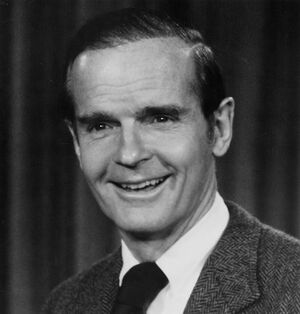William Proxmire
(politician) | |
|---|---|
 | |
| Born | November 11, 1915 |
| Died | December 15, 2005 (Age 90) |
| Nationality | US |
| Alma mater | The Hill School, Yale University, Harvard Business School, Harvard Graduate School of Public Administration |
| Party | Democrat |
Edward William Proxmire was an American politician. A member of the Democratic Party, he was a United States Senator from Wisconsin from 1957 to 1989. He holds the record for being the longest-serving Senator from Wisconsin.[1]
Proxmire was a member of the Senate Banking Committee, the Senate Appropriations Committee, and the Joint Economic Committee. In all of them he was an aggressive critic of wasteful government spending. On the Joint Economic Committee, he exposed numerous instances of wasteful spending on military programs such as the C-5 aircraft and the F-16 fighter, as well as other government programs such as the development of a supersonic transport airplane (SST).
Personal
Proxmire grew up in the state of Pennsylvania. He graduated from the Hill School in Pennsylvania in [1933]]. He studied at Yale University until 1938, then at Harvard University until 1948. His studies were interrupted by military service in the Second World War. He was commissioned in the Military Intelligence branch. Most of his service involved counterintelligence work in the Chicago area, where members of his unit investigated individuals suspected of subversive activity.[2] Proxmire then moved to Wisconsin to work as a reporter for the newspaper The Capital Times on the one hand and to advance his political career in a "favorable" state on the other.
In 1946, he married Elsie Rockefeller, a great-niece of John D. Rockefeller. Together they had two children. In 1955, Elsie divorced him. She later married Miles J. McMillin, a former colleague of Proxmire's at The Capital Times. She was shot by McMillin in 1982.[3]
Proxmire remarried in 1956, this time to Ellen Hodges Sawall. She brought two children into the marriage, together they both had two more sons.[4]
Proxmire was known for his penchant for physical fitness. He regularly jogged and did push-ups. In 1973 he published a book on the subject.
Proxmire died after suffering from Alzheimer's disease.
Political activity
He had his first political experience as a member of the Wisconsin State Assembly between 1951 and 1952 and ran unsuccessfully for governor of Wisconsin in 1952, 1954 and 1956. On August 28, 1957, he was elected to the Federal Senate in the by-election for the seat of the late Senator Joseph McCarthy. He later derogatorily called his predecessor "a disgrace to Wisconsin, the Senate and America". He was re-elected at the regular elections in November 1958, as well as in 1964, 1970, 1976 and 1982.[5] His re-elections have always been characterized by high proportions of votes, including 71% of the vote in 1970, 73% in 1976 and 65% in 1982.
Proxmire holds the record for consecutive roll call votes cast: 10,252 between April 20, 1966 and October 18, 1988.[6] In the years from 1975 to 1981 and from 1987 to 1989, he was chairman of the Committee on Banking, Housing and Urban Affairs.
He was an early critic of the Vietnam War. He criticized U.S. Presidents Lyndon B. Johnson and Richard Nixon for their belligerence and their foreign policy decisions.[6] Proxmire used his seat on the Senate Armed Services Committee to denounce wasteful military spending. For this reason, he founded the Golden Fleece Awards to put the waste of taxpayers' money in the focus of public opinion. They were awarded between 1975 and 1988. Proxmire stood for restrictive budget management, but when it came to milk prices, he was strongly in favor of subsidizing the dairy industry. As Chairman of the Committee on Banking, Housing and Urban Affairs, Proxmire was instrumental in the preparation of New York City's financial planning from 1976 to 1977. This saved New York from bankruptcy. In daily speeches between 1967 and 1986, he strongly advocated the ratification of the Convention on the Prevention and Punishment of Genocide. After his insistence, the Senate ratified the Convention on February 11, 1986 by a vote of 83 to 11.[4]
References
- ↑ http://archive.jsonline.com/news/statepolitics/kohl-makes-farewell-address-to-senate-si8173c-183420931.html
- ↑ https://books.google.com/books?id=h5IYAAAAIAAJ&q=%22Assigned+to+the+counterintelligence+corps+and+the+military+intelligence+service%2C+he+spent+his+entire+tour+of+duty+in+the+United+States%2C+much+of+it+in+the+Chicago+area.%22
- ↑ https://www.nytimes.com/1982/12/24/nyregion/wife-of-former-editor-dies-of-gunshot-wound.html
- ↑ a b https://www.nytimes.com/2005/12/16/national/16proxmire.html
- ↑ https://bioguide.congress.gov/search/bio/P000553
- ↑ a b Gershman, Gary P. (2008). The Legislative Branch of Federal Government: People, Process, and Politics. ABC-CLIO. p. 262. ISBN 9781851097128.